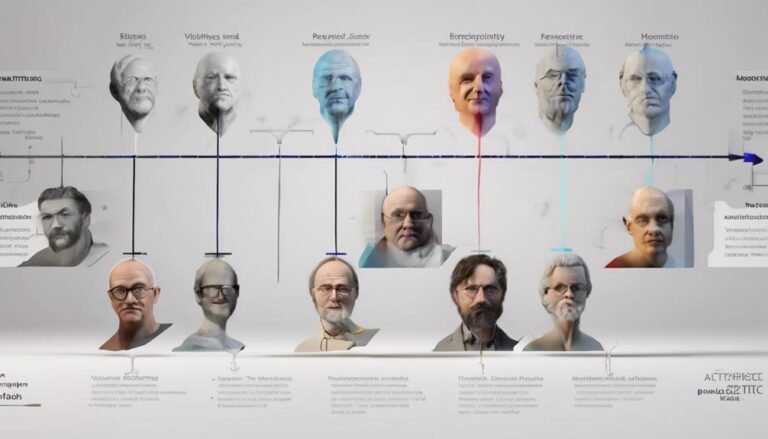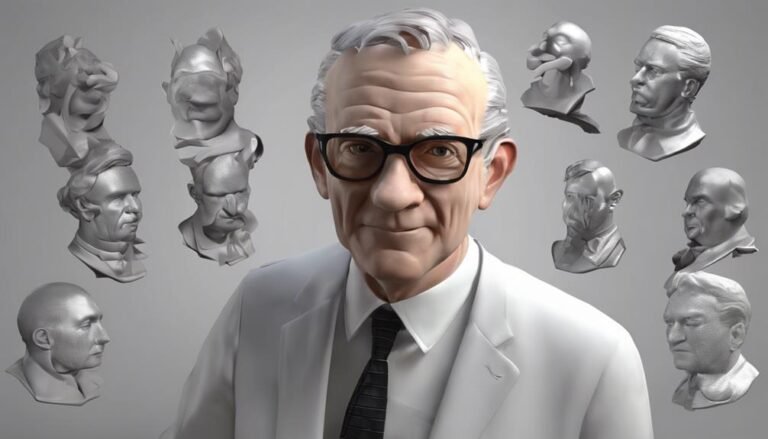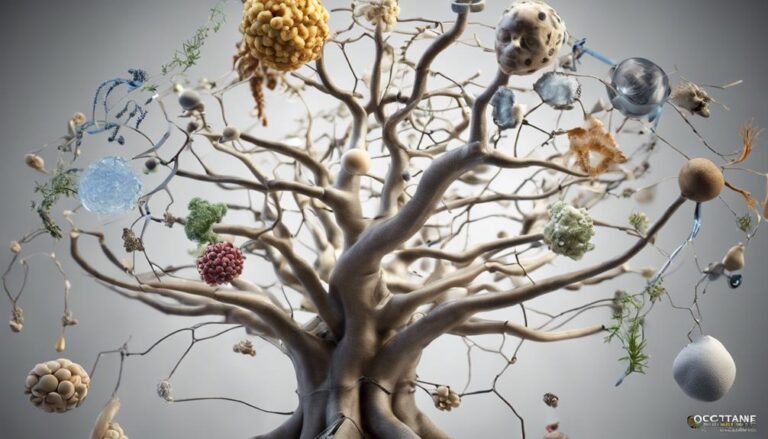Freud’s Psychoanalytic Theory: An Overview
As you contemplate the complexities of human behavior and the mysteries of the mind, consider Freud's Psychoanalytic Theory. Within this framework lies a deep exploration of the unconscious and its profound impact on our daily lives. From repressed memories to defense mechanisms, Freud's insights offer a unique perspective on the inner workings of the human psyche. But how do these concepts translate into practical applications and contemporary psychology? Stay tuned to unravel the enduring enigma of Freud's psychoanalytic legacy.
Key Takeaways
- Freud's psychoanalytic theory emphasizes the unconscious mind's role in shaping thoughts and behaviors.
- Dreams are manifestations of unconscious desires and unresolved conflicts.
- The ego balances the id's primal desires and the superego's moral constraints.
- Defense mechanisms protect individuals from anxiety by distorting reality.
- Psychosexual development involves stages focusing on erogenous zones and developmental tasks.
The Unconscious Mind
In Freud's psychoanalytic theory, the unconscious mind plays a pivotal role in shaping an individual's thoughts, emotions, and behaviors, often influencing them in ways that individuals aren't consciously aware of.
One significant aspect of the unconscious mind is its connections to dream interpretation. Dreams, according to Freud, are manifestations of unconscious desires, fears, and unresolved conflicts. By analyzing dreams, individuals can gain insights into their hidden motivations and emotions that might be repressed in their conscious waking life.
Repressed memories are another essential component of the unconscious mind. Freud believed that traumatic experiences or memories that are too painful for the conscious mind to handle are pushed into the unconscious. These repressed memories can continue to influence an individual's behavior and emotions without their awareness.
Through psychoanalysis, individuals can uncover these repressed memories, bring them into the conscious mind, and work through them to achieve healing and personal growth. The unconscious mind, with its intricate workings and hidden depths, is a fundamental aspect of Freud's psychoanalytic theory that shapes human behavior in profound ways.
Ego and Id
Frequently intertwined in Freud's psychoanalytic theory are the concepts of the ego and id, which represent two distinct yet interconnected aspects of the human psyche.
The ego, operating in the domain of conscious awareness, acts as the mediator between the id's primal desires and the superego's moral constraints. It navigates the demands of reality while satisfying the id's basic urges in socially acceptable ways.
The id, on the other hand, resides in the unconscious and is driven purely by instinctual needs, seeking immediate gratification without regard for consequences.
In the intricate dance of personality dynamics, the ego aims to balance the conflicting demands of the id, superego, and reality. It employs defense mechanisms to protect the individual from anxiety arising from these internal conflicts.
Understanding the interplay between the ego and id provides insights into human behavior, motivations, and the complexities of the mind.
Defense Mechanisms
The utilization of defense mechanisms plays a crucial role in Freud's psychoanalytic theory. These mechanisms aid individuals in managing internal conflicts and protecting themselves from distressing emotions. Coping strategies are essential for maintaining mental health by helping individuals regulate their emotions and achieve psychological well-being.
Defense mechanisms operate unconsciously, allowing individuals to cope with anxiety and protect their self-esteem by distorting reality. For example, repression involves pushing unacceptable thoughts or memories out of consciousness. Denial, another common defense mechanism, involves refusing to acknowledge painful aspects of reality.
Psychosexual Development
Psychosexual development in Freud's psychoanalytic theory encompasses the stages through which individuals pass as they mature, each stage characterized by a focus on specific erogenous zones and associated developmental tasks.
The first stage is the oral stage, where infants derive pleasure from oral activities such as sucking. If there's an oral fixation, it might manifest in habits like overeating or smoking in adulthood.
The second stage is the anal stage, where focus shifts to toilet training and control. Following this is the phallic stage, marked by the Oedipus complex in boys and the Electra complex in girls, where children develop unconscious desires for the opposite-sex parent. Resolving these conflicts is essential for healthy development.
Subsequently, the latency stage is a period of suppressed sexuality, leading to the genital stage, where mature sexual interests emerge. Understanding these stages offers insights into personality development and potential sources of psychological issues.
Criticisms and Contemporary Relevance
Critics of Freud's psychoanalytic theory have raised significant concerns regarding its scientific validity and applicability to contemporary psychology. The validity debate surrounding Freud's theories stems from the lack of empirical evidence supporting many of his concepts, such as the Oedipus complex and the role of the unconscious mind. Critics argue that Freud's reliance on case studies and interpretations of subjective experiences don't meet the rigorous standards of modern scientific inquiry.
However, despite these criticisms, Freud's psychoanalytic theory still holds contemporary relevance in certain areas of psychology. Modern applications of Freudian concepts can be seen in psychodynamic therapy, where therapists explore unconscious conflicts and childhood experiences to understand and treat mental health issues.
Additionally, Freud's emphasis on the importance of early childhood experiences in shaping personality traits has influenced the field of developmental psychology.
While Freud's psychoanalytic theory may not be universally accepted in the scientific community, its impact on psychology and therapy continues to be acknowledged in contemporary practice.
Conclusion
To sum up, Freud's Psychoanalytic Theory offers valuable insights into the complexities of the human mind, shedding light on unconscious influences and early childhood experiences.
While some may criticize Freud's theories as outdated or lacking empirical evidence, it's important to recognize the enduring impact his work has had on psychology and therapy.
By understanding the dynamic interplay between the ego, id, and superego, individuals can gain a deeper understanding of their thoughts, behaviors, and motivations.







